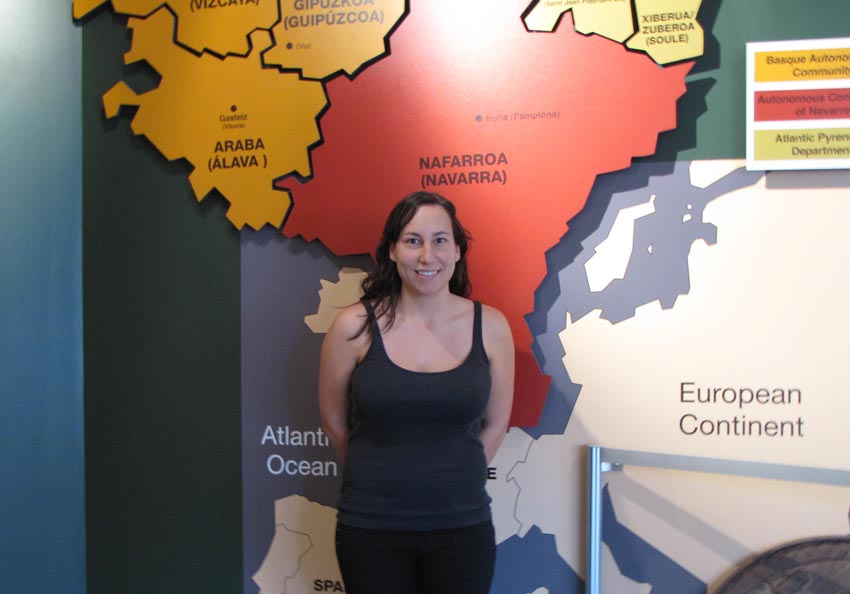Joseba Etxarri. When talking about her personal story, we say that Itxaso Cayero was born in Boise, even though she moved to Mungia Bizkaia at a very young age. When she turned 17, she returned to Boise where these last years she has been working as an instructor and a teacher. On January 1st of 2014, she was chosen by NABO, along with Aitor Iñarra, from San Francisco, to serve as Euskera coordinator, supporting the work by Martin Goicochea of Wyoming as Euskera Chair. In Boise, along with teaching Basque, or part of her role, she also serves as a cheerleader and cultural revitalizer, supporting activities in Basque such as popular celebrations, games, songs, videos, and other leisure activities. This also includes organizing public events like the songs of Santa Agueda, Korrika that will take place next April, or a visit from Olentzero, as part of the active and joyful life of her surroundings, Basque and non-Basque alike, in the capital of Idaho.
-December is usually a very busy month, as it is in the Boise Basque community…
-We don’t stop. We always have something going on, especially on the Basque Block. On December 3rd we always celebrate ENE or the International Day of Euskera. In Boise this year the Basque students invited various musician friends and we celebrated it singing. These are special days, and we usually go bar hopping in Basque or sing Christmas Carols in the bars on the Basque Block. This year, the Oinkaris are also celebrating their 50th anniversary and they organized a nice event with five of their founding members that was really fun, and gathered a log of people. Members of the Biotzean Choir visited rest homes and houses singing Christmas Carols. And don’t forget the Sheepherder’s Ball whose proceeds go to support local people in need; it is a tradition here, open but very linked to the Basque community. Jesus Alcelay cooked and prepared a meal at the Basque Center, followed by a performance by the Oinkaris, a lam raffle and dancing to Amuma Says No…along with a visit from Olentzero, of course…
-Olentzero made it to Boise…
Of course he did (laughing). He came to the Basque Center to pass out gifts to the children. They waited expectantly and danced Basque dances for him. We have a music group called Txantxangorriak, a special music school for children and teenagers and the trikitilaris and panderojoles of the group played some special songs for him. Olentzero came to the Center on the 7th and then to the Ikastola on the 16th. At the Ikastola the children gave him their letters and brought him cookies in case he was hungry. We sang some Christmas songs and everyone got a gift. Patxi Lostra played Olentzero for 10 years and when he couldn’t we count on Ramon Ysursa, Sean Aucutt or Raimundo Uriarte. This year, the children were able to dress as baserritarras thanks to the outfits sent from Euskadi.
-Do you have a traditional Basque New Year’s celebration?
The Leku Ona Restaurant on the Basque Block has a special menu. We gather for dinner, but I’m not aware of a special Basque custom or happening, like they have in San Francisco and other places.
-Changing the topic. How many students are currently studying Basque in NABO clubs?
Almost 200, 195 students.
-And how many people are being trained by HABE as part of the Euskara Munduan program to eventually teach Basque?
This year we had 33 new sign ups, studying with Boga.
-2015 which begins in a few days, Jaialdi year…
There are very high expectations this year. The impression we got is that this huge Basque festival organized in Boise every five years is going to surpass next summer previous year’s numbers that were already very high, so the last days of July and the 1st and 2nd of August are going to be a real Basque hotbed for anyone wishing to visit. It’s a world of its own. NABO has requested to have an Euskera stand with computers so that we can explain better what we do and what we offer, including face-to-face and online classes (Boga).
-Doesn’t seem like you’re lacking plans…
By March I would like to finish the second book I am doing for those who teach children Basque. We are also organizing Korrika this year, and so I would like to invite all the Basque clubs to join in with their own events…As you said there is no lack of work but we do it joyfully. That is the most important in my opinion, be happy in what you do and show everyone that Euskera contributes positively to your life, having fun with friends, feeling better about yourself, this is the best way to attract folks to Euskera and the Basque culture.






 Send to a friend
Send to a friend Add comment
Add comment








